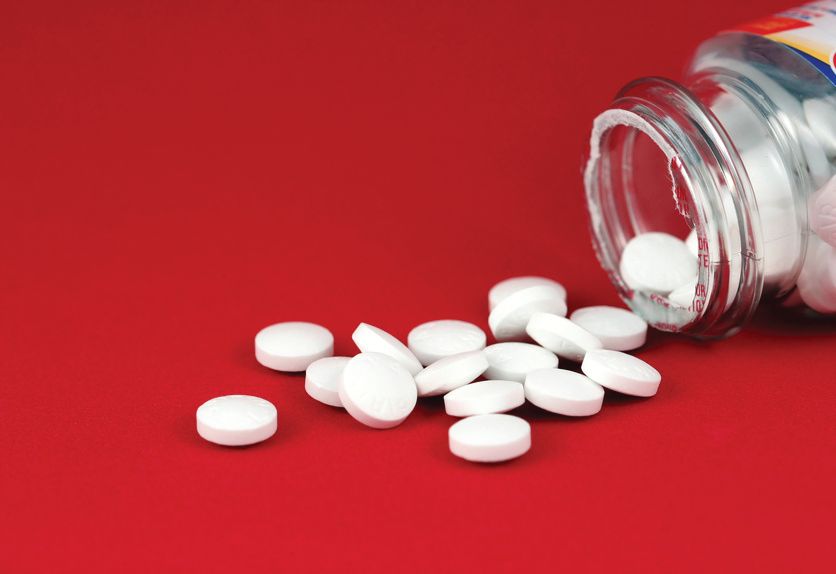User login
While low-dose aspirin has been shown for decades to decrease the risk of preterm preeclampsia, yet to be established are the optimal dose and time of day to administer aspirin; how preeclampsia risk is best assessed; and at what gestational week it is best to start aspirin.
New findings from a randomized, double-blind, placebo-controlled trial show that a daily 150-mg dose of aspirin, taken at night, significantly reduced incidence of preterm preeclampsia in women identified as being at high risk in the first trimester (N Engl J Med. 2017 June 28. doi: 10.1056/NEJMoa1704559).
After 156 women dropped out of the study or were lost to follow-up, investigators had results from 798 women in the aspirin group and 822 in the placebo group, with about 80% of subjects having taken aspirin or placebo as directed. The study’s primary outcome was delivery with preeclampsia before 37 weeks, seen in 13 women (1.6%) in the aspirin group, compared with 35 (4.3%) in the placebo group (odds ratio 0.38; 95% confidence interval, 0.20 to 0.74; P = .004).
Other decisions incorporated into the study design, including those about aspirin dosage (higher than the currently recommended 60-80 mg for this population), taking aspirin at night, and the gestational age at which to start aspirin, were based on results from prior trials, studies, and meta-analyses, the researchers said.
Screening at 11-13 weeks’ gestation identifies less than 40% of term preeclampsia, studies have shown, and aspirin did not reduce term preeclampsia in this study, the investigators said.
The European Union Seventh Framework Program and the Fetal Medicine Foundation (UK) sponsored the study. None of the investigators had any relevant financial disclosures.
While low-dose aspirin has been shown for decades to decrease the risk of preterm preeclampsia, yet to be established are the optimal dose and time of day to administer aspirin; how preeclampsia risk is best assessed; and at what gestational week it is best to start aspirin.
New findings from a randomized, double-blind, placebo-controlled trial show that a daily 150-mg dose of aspirin, taken at night, significantly reduced incidence of preterm preeclampsia in women identified as being at high risk in the first trimester (N Engl J Med. 2017 June 28. doi: 10.1056/NEJMoa1704559).
After 156 women dropped out of the study or were lost to follow-up, investigators had results from 798 women in the aspirin group and 822 in the placebo group, with about 80% of subjects having taken aspirin or placebo as directed. The study’s primary outcome was delivery with preeclampsia before 37 weeks, seen in 13 women (1.6%) in the aspirin group, compared with 35 (4.3%) in the placebo group (odds ratio 0.38; 95% confidence interval, 0.20 to 0.74; P = .004).
Other decisions incorporated into the study design, including those about aspirin dosage (higher than the currently recommended 60-80 mg for this population), taking aspirin at night, and the gestational age at which to start aspirin, were based on results from prior trials, studies, and meta-analyses, the researchers said.
Screening at 11-13 weeks’ gestation identifies less than 40% of term preeclampsia, studies have shown, and aspirin did not reduce term preeclampsia in this study, the investigators said.
The European Union Seventh Framework Program and the Fetal Medicine Foundation (UK) sponsored the study. None of the investigators had any relevant financial disclosures.
While low-dose aspirin has been shown for decades to decrease the risk of preterm preeclampsia, yet to be established are the optimal dose and time of day to administer aspirin; how preeclampsia risk is best assessed; and at what gestational week it is best to start aspirin.
New findings from a randomized, double-blind, placebo-controlled trial show that a daily 150-mg dose of aspirin, taken at night, significantly reduced incidence of preterm preeclampsia in women identified as being at high risk in the first trimester (N Engl J Med. 2017 June 28. doi: 10.1056/NEJMoa1704559).
After 156 women dropped out of the study or were lost to follow-up, investigators had results from 798 women in the aspirin group and 822 in the placebo group, with about 80% of subjects having taken aspirin or placebo as directed. The study’s primary outcome was delivery with preeclampsia before 37 weeks, seen in 13 women (1.6%) in the aspirin group, compared with 35 (4.3%) in the placebo group (odds ratio 0.38; 95% confidence interval, 0.20 to 0.74; P = .004).
Other decisions incorporated into the study design, including those about aspirin dosage (higher than the currently recommended 60-80 mg for this population), taking aspirin at night, and the gestational age at which to start aspirin, were based on results from prior trials, studies, and meta-analyses, the researchers said.
Screening at 11-13 weeks’ gestation identifies less than 40% of term preeclampsia, studies have shown, and aspirin did not reduce term preeclampsia in this study, the investigators said.
The European Union Seventh Framework Program and the Fetal Medicine Foundation (UK) sponsored the study. None of the investigators had any relevant financial disclosures.
FROM NEW ENGLAND JOURNAL OF MEDICINE
Key clinical point:
Major finding: Among patients taking aspirin, 1.6% developed preterm preeclampsia, compared with 4.3% of those taking placebo (odds ratio 0.38; 95% confidence interval, 0.20 to 0.74; P = .004).
Data source: A randomized, international, multicenter trial enrolling nearly 1,800 women identified through screening as being at high risk of preeclampsia.
Disclosures: The European Union Seventh Framework Program and the Fetal Medicine Foundation (UK) sponsored the study. None of the investigators had any relevant financial disclosures.


